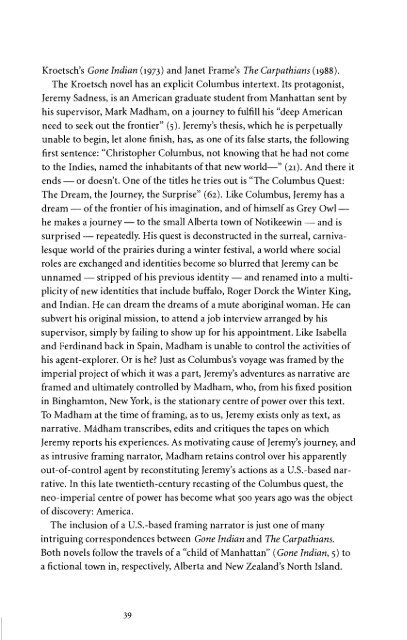The Carpathians - University of British Columbia
The Carpathians - University of British Columbia
The Carpathians - University of British Columbia
Create successful ePaper yourself
Turn your PDF publications into a flip-book with our unique Google optimized e-Paper software.
Kroetsch's Gone Indian (1973) and Janet Frame's <strong>The</strong> <strong>Carpathians</strong> (1988).<br />
<strong>The</strong> Kroetsch novel has an explicit Columbus intertext. Its protagonist,<br />
Jeremy Sadness, is an American graduate student from Manhattan sent by<br />
his supervisor, Mark Madham, on a journey to fulfill his "deep American<br />
need to seek out the frontier" (5). Jeremy's thesis, which he is perpetually<br />
unable to begin, let alone finish, has, as one <strong>of</strong> its false starts, the following<br />
first sentence: "Christopher Columbus, not knowing that he had not come<br />
to the Indies, named the inhabitants <strong>of</strong> that new world—" (21). And there it<br />
ends — or doesn't. One <strong>of</strong> the titles he tries out is "<strong>The</strong> Columbus Quest:<br />
<strong>The</strong> Dream, the Journey, the Surprise" (62). Like Columbus, Jeremy has a<br />
dream — <strong>of</strong> the frontier <strong>of</strong> his imagination, and <strong>of</strong> himself as Grey Owl —<br />
he makes a journey — to the small Alberta town <strong>of</strong> Notikeewin — and is<br />
surprised — repeatedly. His quest is deconstructed in the surreal, carnivalesque<br />
world <strong>of</strong> the prairies during a winter festival, a world where social<br />
roles are exchanged and identities become so blurred that Jeremy can be<br />
unnamed — stripped <strong>of</strong> his previous identity — and renamed into a multiplicity<br />
<strong>of</strong> new identities that include buffalo, Roger Dorck the Winter King,<br />
and Indian. He can dream the dreams <strong>of</strong> a mute aboriginal woman. He can<br />
subvert his original mission, to attend a job interview arranged by his<br />
supervisor, simply by failing to show up for his appointment. Like Isabella<br />
and Ferdinand back in Spain, Madham is unable to control the activities <strong>of</strong><br />
his agent-explorer. Or is he? Just as Columbus's voyage was framed by the<br />
imperial project <strong>of</strong> which it was a part, Jeremy's adventures as narrative are<br />
framed and ultimately controlled by Madham, who, from his fixed position<br />
in Binghamton, New York, is the stationary centre <strong>of</strong> power over this text.<br />
To Madham at the time <strong>of</strong> framing, as to us, Jeremy exists only as text, as<br />
narrative. Mâdham transcribes, edits and critiques the tapes on which<br />
Jeremy reports his experiences. As motivating cause <strong>of</strong> Jeremy's journey, and<br />
as intrusive framing narrator, Madham retains control over his apparently<br />
out-<strong>of</strong>-control agent by reconstituting Jeremy's actions as a U.S.-based narrative.<br />
In this late twentieth-century recasting <strong>of</strong> the Columbus quest, the<br />
neo-imperial centre <strong>of</strong> power has become what 500 years ago was the object<br />
<strong>of</strong> discovery: America.<br />
<strong>The</strong> inclusion <strong>of</strong> a U.S.-based framing narrator is just one <strong>of</strong> many<br />
intriguing correspondences between Gone Indian and <strong>The</strong> <strong>Carpathians</strong>.<br />
Both novels follow the travels <strong>of</strong> a "child <strong>of</strong> Manhattan" (Gone Indian, 5) to<br />
a fictional town in, respectively, Alberta and New Zealand's North Island.

















